Filter by

A City in Blue and Green The Singapore Story
This open access book highlights Singapore’s development into a city in which water and greenery, along with associated environmental, technical, social and political aspects have been harnessed and cultivated into a liveable sustainable way of life. It is also a story about a unique and thoroughgoing approach to large-scale and potentially transferable water sustainability, within largely ur…
- Edition
- 1
- ISBN/ISSN
- 9789811395970
- Collation
- X, 152 hlm; ill., lamp.,
- Series Title
- -
- Call Number
- -
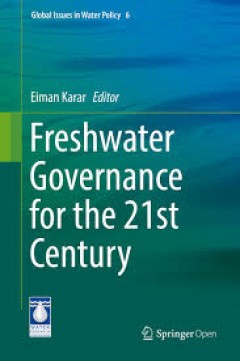
Freshwater Governance for the 21st Century
The objective of this book is to broadly illustrate the key aspects of water governance, mapping the spectrum of decision-making from techno-centric and eco-centric approaches, to hybrid concepts and people-centric approaches. Topics covered include the challenges for water-governance models, the polycentric model, the integration challenge, water in the decision-making hierarchy, and the rise …
- Edition
- -
- ISBN/ISSN
- 978-3-319-43350-9
- Collation
- XXVII, 250
- Series Title
- 6
- Call Number
- -

Adaptive Strategies for Water Heritage: Past, Present and Future
This Open Access book, building on research initiated by scholars from the Leiden-Delft-Erasmus Centre for Global Heritage and Development (CHGD) and ICOMOS Netherlands, presents multidisciplinary research that connects water to heritage. Through twenty-one chapters it explores landscapes, cities, engineering structures and buildings from around the world. It describes how people have actively …
- Edition
- 1
- ISBN/ISSN
- 9783030002688
- Collation
- XIX, 435 hlm; ill., lamp.,
- Series Title
- -
- Call Number
- -
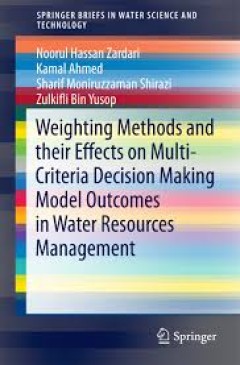
Weighting Methods and their Effects on Multi-Criteria Decision Making Model O…
This book provides a systematic way of how to make better decisions in water resources management. The applications of three weighting methods namely rating, ranking, and ratio are discussed in this book. Additionally, data mining on keywords is presented using three popular scholarly databases: Science Direct, Scopus, and SciVerse. Four abbreviated keywords (MCDM, MCDA, MCA, MADM) representing…
- Edition
- -
- ISBN/ISSN
- 978-3-319-12586-2
- Collation
- -
- Series Title
- -
- Call Number
- -
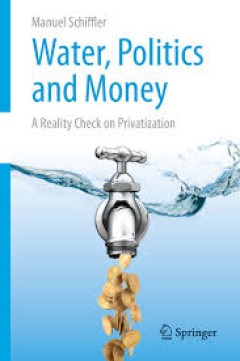
Water, Politics and Money A Reality Check on Privatization
This book reveals all that can potentially happen when a private company takes over a local water supply system, both the good and the bad. Backed by real life stories of water privatization in action, author Manuel Schiffler presents a nuanced picture free of spin or fear mongering. Inside, readers will find a detailed analysis of the multiple forms of water privatization, from the outright…
- Edition
- -
- ISBN/ISSN
- 978-3-319-16691-9
- Collation
- -
- Series Title
- -
- Call Number
- -
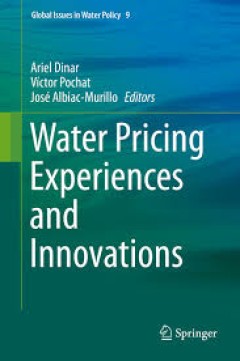
Water Pricing Experiences and Innovations
Water pricing to achieve conservation in scarce water resources is a major policy challenge. This book provides credible evidence from water pricing experiences in various countries around the world. The book chapters, written by experts in water pricing from various countries, documents the past 10 to 15 years of water pricing experiences in Australia, Brazil, Canada, China, Colombia, France, …
- Edition
- -
- ISBN/ISSN
- 978-3-319-16465-6
- Collation
- -
- Series Title
- -
- Call Number
- -
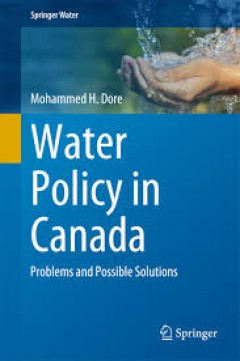
Water Policy in Canada Problems and Possible Solutions
This book deals with the water policy and management in Canada. It discusses various problems and risks in the fresh and drinking water supply in the second largest country in the world. Mohammed Dore argues that water is underpriced and used wastefully in Canada. In selected case studies, he illustrates the major threats from human activity to Canadian freshwaters and drinking water resources,…
- Edition
- -
- ISBN/ISSN
- 978-3-319-15883-9
- Collation
- -
- Series Title
- -
- Call Number
- -
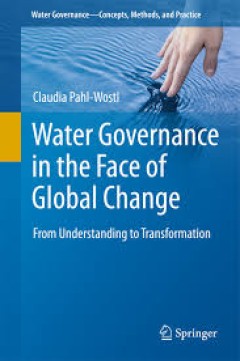
Water Governance in the Face of Global Change From Understanding to Transfor…
This book offers the first comprehensive treatment of multi-level water governance, developing a conceptual and analytical framework that captures the complexity of real water governance systems while also introducing different approaches to comparative analysis. Applications illustrate how the ostensibly conflicting goals of deriving general principles and of taking context-specific factors in…
- Edition
- -
- ISBN/ISSN
- 978-3-319-21855-7
- Collation
- -
- Series Title
- -
- Call Number
- -
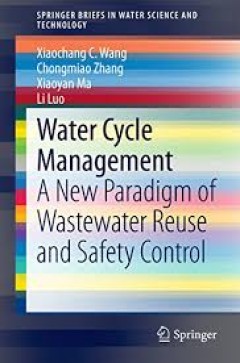
Water Cycle Management A New Paradigm of Wastewater Reuse and Safety Control
This book focuses on environmental engineering, and on wastewater treatment and reuse in particular, which is a vital aspect for countries and regions suffering from water shortages. It introduces a new water cycle management concept for designing water systems that mimic the hydrological cycle, where reclaimed water is produced, stored/regulated, supplied and used in a semi-natural manner so t…
- Edition
- -
- ISBN/ISSN
- 978-3-662-45821-1
- Collation
- -
- Series Title
- -
- Call Number
- -
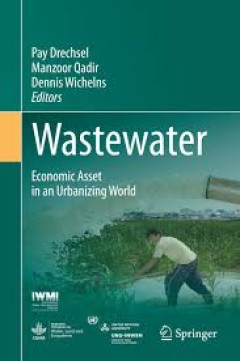
Wastewater Economic Asset in an Urbanizing World
The books provides a timely analysis in support of a paradigm shift in the field of wastewater management, from ‘treatment for disposal’ to ‘treatment for reuse’ by offering a variety of value propositions for water, nutrient and energy recovery which can support cost savings, cost recovery, and profits, in a sector that traditionally relies on public funding. The book provides new insi…
- Edition
- -
- ISBN/ISSN
- 978-94-017-9545-6
- Collation
- -
- Series Title
- -
- Call Number
- -
 Computer Science, Information & General Works
Computer Science, Information & General Works  Philosophy & Psychology
Philosophy & Psychology  Religion
Religion  Social Sciences
Social Sciences  Language
Language  Pure Science
Pure Science  Applied Sciences
Applied Sciences  Art & Recreation
Art & Recreation  Literature
Literature  History & Geography
History & Geography